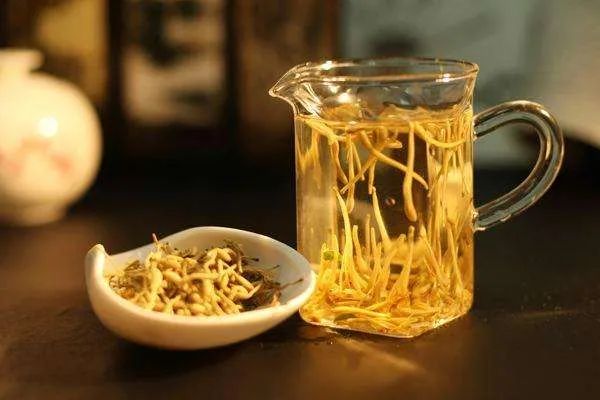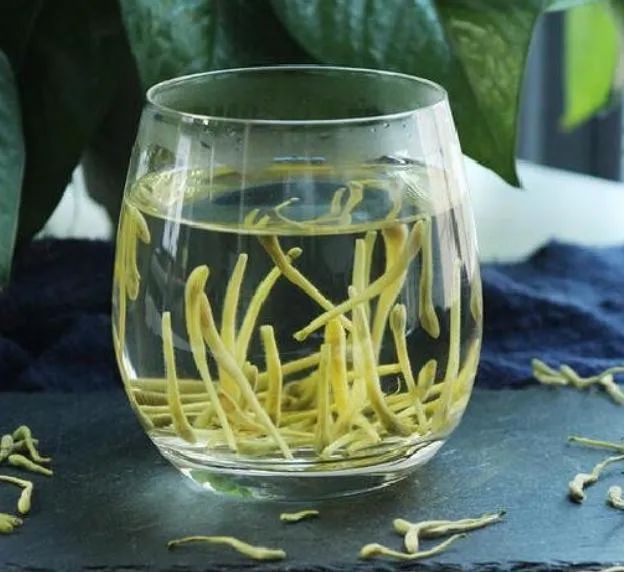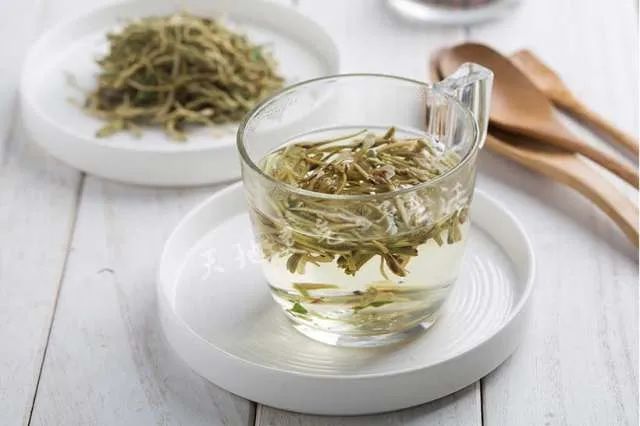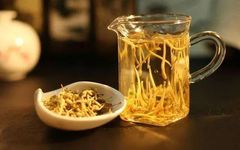
Honeysuckle, also known as Jin Yin Hua (金银花), is a traditional Chinese medicinal herb. The flowers start as white and turn yellow, hence the name Honeysuckle. It is a medicinal material that can be consumed raw or dried and prepared like green tea. It has detoxifying, anti-inflammatory, antibacterial, diuretic, and anti-itching properties. Let’s explore the efficacy and uses of Honeysuckle, as well as the correct method for brewing Honeysuckle tea!

01
The Efficacy and Uses of Honeysuckle
1. Enhancing Immune Function
Certain substances in Honeysuckle can effectively promote the transformation of lymphocytes, thereby enhancing the phagocytic function of white blood cells, which improves the body’s resistance.
2. Clearing Heat and Detoxifying
Honeysuckle has excellent heat-clearing and detoxifying properties, particularly effective for certain positive sores and ulcers. It can be combined with Bo He (薄荷, Peppermint), Niubangzi (牛蒡子, Burdock Seed), and Lian Qiao (连翘, Forsythia) for decoction, which has a good effect of dispersing heat and relieving exterior symptoms. If combined with Lian Qiao, fresh Sheng Di Huang (生地黄, Rehmannia), Zhu Ye (竹叶, Bamboo Leaf), and Xuan Shen (玄参, Scrophularia), the effect mainly focuses on clearing heat.
3. Dispersing Heat and Evils
If one experiences headaches, fever, insomnia, or fatigue, drinking Honeysuckle tea can help regulate the body. Additionally, if there are symptoms like chapped lips and dry mouth, Honeysuckle can also provide relief.
4. Assisting with Diarrhea and Hemorrhoids
Honeysuckle can be brewed in water or decocted in a clean pot, providing excellent cooling blood, stopping diarrhea, and detoxifying effects. Its cooling blood properties make it very helpful for these conditions.
5. Anti-inflammatory Effects
Once Honeysuckle enters the body, it can effectively promote the release of adrenal cortex hormones, which have a good inhibitory effect on various inflammatory and painful conditions.
6. Relieving Fever
If one experiences rashes or spots due to internal heat, accompanied by itching, drinking Honeysuckle tea can help clear heat and detoxify. For those with sore throats, boiling Honeysuckle with Huang Qin (黄芩, Scutellaria) can significantly improve symptoms.

02
Proper Method for Brewing Honeysuckle Tea
The amount of Honeysuckle used for brewing tea should not be excessive; generally, 3 to 5 grams of Honeysuckle is sufficient. Rinse it and place it in a glass tea cup, then add about 250 mL of boiling water (ideally at 92 to 95 degrees Celsius), cover the cup, and wait for about 5 minutes. The resulting Honeysuckle tea should appear bright yellow-green and taste fragrant and refreshing. Honeysuckle can be steeped multiple times, but it is recommended to drink it while hot for better nutrient absorption.
What to Pair with Honeysuckle for Brewing
Honeysuckle has no significant toxic side effects and can be combined with various other herbs, such as Ju Hua (菊花, Chrysanthemum), Bo He (薄荷, Peppermint), Zhu Ye (竹叶, Bamboo Leaf), Gan Cao (甘草, Licorice), and Mai Dong (麦冬, Ophiopogon). Below are two common pairing methods:
Honeysuckle Chrysanthemum Tea
Ingredients: 15 grams of Honeysuckle, 5 Chrysanthemum flowers, appropriate amount of white sugar or rock sugar.
Instructions:
1. Place Honeysuckle, Chrysanthemum, and sugar in a tea cup.
2. Add boiling water to steep.
3. Stir the sugar until dissolved.
4. Cover and let steep for 10-15 minutes.
5. Allow to cool slightly before drinking.
Honeysuckle Peppermint Tea
Instructions:
1. Place 10 grams each of Honeysuckle and Peppermint in a cup.
2. Pour boiling water to steep.
3. Cover and let steep for about 15 minutes.
4. Add an appropriate amount of honey before drinking.

——Previous Articles——
|
Health |
The Efficacy and Uses of Deer Antler Paste, Contraindications for Deer Antler Paste |
|
Wellness |
The Efficacy and Uses of Chrysanthemum and Cassia Tea, How to Brew Chrysanthemum and Cassia Tea |
|
Encyclopedia |
The Efficacy and Uses of Red Bean Porridge, What are the Dietary Contraindications? |
|
Science |
The Efficacy and Uses of Black Sesame, What are the Dietary Contraindications? |
|
Knowledge |
The Efficacy and Uses of Chrysanthemum and Cassia Tea, Contraindications for Chrysanthemum and Cassia Tea |
END
Dear reader, if our article has been helpful to you,please “star” us ★ so you won’t miss our daily updates!

【Disclaimer】: This article is sourced from the internet, and the copyright belongs to the original author. Please indicate the source when reprinting. Sharing this article is for the purpose of dissemination and learning exchange, and we do not take responsibility for the views expressed in the article. The various dietary therapy methods, prescriptions, and remedies mentioned are for reference and learning only; non-professionals should not use them blindly! The advertisements in the article are automatically generated by the system and are unrelated to this account. If you have any questions, please leave a message online, and we will address it as soon as possible. Thank you.
Click to spread health and share knowledge~👉

